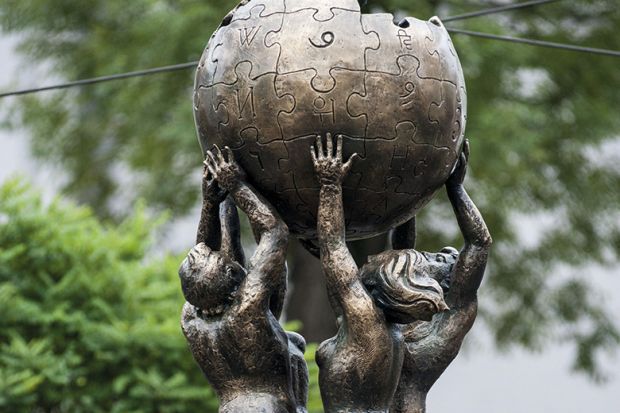A decade ago, Amy Carleton, a lecturer in comparative media studies at the Massachusetts Institute of Technology, had a sign in her classroom in capital letters that read: “Wikipedia is not a source”.
Fast forward to 2018 and not only has Dr Carleton taken down the sign but she is now using the online encyclopedia to help teach her courses.
The change of heart came after a student, who was writing an assignment on a type of indigenous South American folk music, told her that he was struggling to find any literature on the topic. “Of course I didn’t believe him when he said that the only thing he had found was a Wikipedia source,” Dr Carleton told Times Higher Education.
On closer inspection, she found that her student was correct. “The topic he was writing about was not one that was being written about by academics in traditional journals,” she explained. The Wikipedia page uncovered by her student contained high-quality and valuable information about the subject, she said, which got her thinking.
“In subsequent semesters I developed an assignment for students where they were doing a critical analysis of a Wikipedia article,” Dr Carleton said. Over time, she started getting her students to produce Wikipedia articles themselves.
“I did that on my own for a while with mixed success. Then Wiki Education was established,” she said.
Wiki Education hopes to bring academia and Wikipedia closer together. It was formed in 2013 as a spin-off of the Wikimedia Foundation, the non-profit organisation that runs Wikipedia – now the world's fifth most popular website. Wikipedia, which allows anyone to write and edit entries, has more than 40 million articles in 299 languages.
Wiki Education’s Classroom Programme offers tools and training that enable university lecturers to integrate Wikipedia assignments into their courses. Typically students are asked to write a new Wikipedia entry, which includes doing their own research, analysing the available sources, and integrating feedback from the Wikipedia community.
The programme provides a dashboard that teaches students how to edit Wikipedia and track their progress, and allows teachers to create assignments for students and track how they are doing.
Other free services that the organisation offers include tutorials about how to contribute to Wikipedia, and help designing assessments and support for teachers.
Frank Schulenburg, executive director of Wiki Education, said that the project initially started in 2010 as a pilot to see whether a topic area of Wikipedia could be systematically improved with the help of students.
“That went pretty well…it became evident that this would be something that became beneficial for both sides,” he said.
So far, more than 42,000 university students across the US have participated in the initiative, with other participating institutions including the University of Washington and Rice University.
“What we learned over time is that the students get learning outcomes out of this that they would not get otherwise,” Mr Schulenburg continued. Most students are more motivated as the real-world nature of the assignment to create content that will be read by an audience means they put in more effort, and it helps to develop information literacy, he added.
“They learn to distinguish between good-quality content on Wikipedia and content that is not so good,” Mr Schulenburg said.
Back at MIT, as one of their assignments, Dr Carleton’s students have to write a brand new Wikipedia article or add substantially to an existing one that needs developing. “It is one of the cornerstones of my writing class. Students love it,” she said.
The most recent crop of students in the Science Writing and the Public course wrote articles about sucrose esters (emulsifiers used in food products) and a Casio calculator as a component of their autumn semester assignments.
As part of the assignment, Dr Carleton teaches students to write from a neutral point of view and hosts class discussions about the people, cultures and accomplishments that are missing from the encyclopedia – an important issue given that the majority of people who edit the site are young, white men.
Students also write a reflective piece about the process of writing for Wikipedia, which often highlights how the skills that students are using are increasingly important given the growing prevalence of “fake news”.
“They talk about things like how the assignment really cultivates a sensitivity to and awareness of the utility of sources. They start to understand how important it is to have a high-quality source to back up any statements that they are making,” Dr Carleton said.




